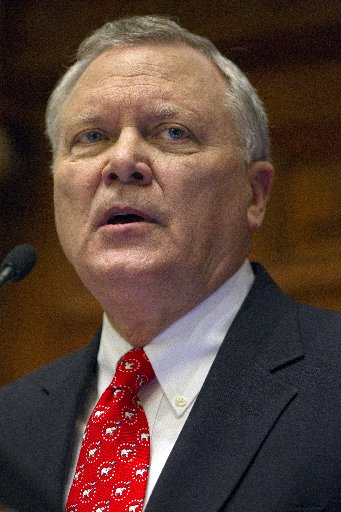ATLANTA - The state's improving financial outlook could mean a modest funding increase for Georgia's judiciary after years of bruising budget battles that turned the judicial branch into a favorite target of lawmakers seeking to slash spending.
The judicial branch's budget situation was so dire in 2009 that Georgia's top judges considered whether to take emergency legal action to stop the state from cutting their funding. But rising tax revenue and support from Gov. Nathan Deal, an attorney whose son is a North Georgia judge, has helped buoy the judiciary's hopes for the upcoming year.
"I'm very much encouraged," said Cordele Superior Court Judge John Pridgen, head of the Council of Superior Court Judges. "We're not going to recover all that was lost in the short run, but the mood is much better. And there's some hope on our part that we can at least regain some of the things we've lost in the hard budgetary times."
Deal actually has little say in the judicial proposals included in his budget, which was released Wednesday. The state's separation of powers requires the governor to submit the spending plan the judiciary sends him. But one item he made sure to add to the request is one of his pet projects: A $10 million grant to fund a system of accountability courts for the alternative treatment of some low-level offenders.
"While these reforms require an initial investment, they will increase public safety, and ultimately save money by creating a more effective corrections system that rehabilitates people, closing the revolving door," Deal told lawmakers this week.
The rest of the request includes funding increases that would allow the hiring of more clerks, additional attorneys and new equipment to help the courts reverse a backlog of court cases.
It gives prosecutors a nearly $3 million boost that would partly go to hire victim advocates and new assistant district attorneys, and proposes a new infusion of cash for the public defender system to meet rising costs. It would grant $145,000 in extra spending to the Georgia Supreme Court to fund a pay hike for staff attorneys and create a dedicated clerk for death penalty cases.
The Judicial Qualifications Commission would get $106,000 to hire another investigator - a move that delights director Jeff Davis, who has long argued that more staff are needed to meet the growing number of misconduct complaints. The Georgia Resource Center, which handles death penalty appeals, would get enough money this year to keep doors open after losing most of its funding amid the economic troubles.
The proposal is just part of a long process, and lawmakers will now spend the next few months wrangling over the details. But judicial branch officials say they're confident they are far removed from the more tumultuous times in recent years when stiff cuts threatened to spark a legal battle between the governor's office and the judicial branch.
The tension reached a head in 2009 when plummeting tax collections forced then-Gov. Sonny Perdue to order all state agencies - the judiciary included - to cut their budgets by 25 percent for the month of June. Georgia's leading attorneys went on the offensive, arguing that Perdue lacked the legal authority to slash the judiciary's funding. The governor warned them not to pursue "futile and unwise litigation" and the fight seemed headed for a courtroom until the two branches struck a compromise that allowed both sides to save face.
A year later, Chief Justice Carol Hunstein warned that the courts were in peril of failing to fulfill their constitutional mandates due to another round of deep cuts that forced offices to fire staff and furlough workers. The Georgia Supreme Court, for instance, banned travel, closed its modest law library, furloughed the justices and fired staff.
But rebounding tax revenues have helped transform the mood.
"The General Assembly was really pressured to minimize cuts in other agencies and they were looking to the judicial branch as a bit of a bank," said Alan Essig, executive director of the nonpartisan Georgia Budget and Policy Institute. "I think that kind of pressure is off. The General Assembly will do their due diligence to make the judicial branch defend their request, as they should. But I think the atmosphere and the pressures on the General Assembly to try to find money is not there as much."
It's still early in the process, and legal agencies are gearing up for the fight.
The Georgia Resource Center, which represents death row inmates seeking appeals, is hoping an infusion of cash will allow it to keep running after years of damaging budget cuts. The governor's proposal includes $170,000 for the rest of this fiscal year and an additional $234,000 for next year, but director Brian Kammer said he knows it's just the start of a long funding fight.
"Whether or not we can get the Assembly to adopt it is the real battle," he said.
